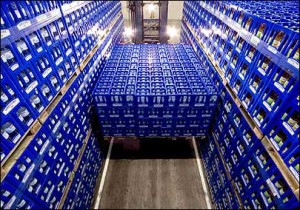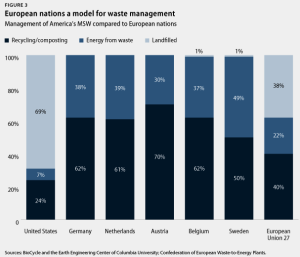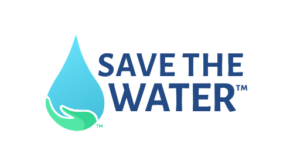
By Emily Stallings, staff writer for Save The Water™ | May 14th 2014
Plentiful water in Germany
Germany, as well as other European countries, is known for its stellar drinking water. There are over 450 brands of German bottled water. For a country of approximately 83 million people, a plethora of drinking water options exist. In comparison, the United States has a population of 314 million people and roughly 100 companies.1,2,3 Whether it’s with bubbles, still, or anything in between, you will likely see a German household stocked with a few dozen liters of high-quality mineral water. There aren’t just a few shelves of water in the German supermarket, but several aisles.
Then there is German beer. With roughly 1,250 breweries, Germany has four times more breweries than the entire European Union’s supply combined.4 Most diners at German restaurants have a liter of mineral water, beer, and the occasional Riesling. If you order water, you will receive mineral or spring, as it is social taboo to serve Leitungswasser, or tap water. The Germans love their mineral and spring waters, and they take steps to ensure its quality.
Germany’s environmental impact
The country is proactive with its environment, since these natural waters, as well as beer, are widely consumed. Yale University’s 2014 Environmental Performance Index (EPI) gives additional insight into each nation’s environmental performance, and Germany ranks sixth in the world. It is also worth noting that European nations have 13 of the 15 top spots in the EPI.5 One interesting example of Germany’s environmental impact is the garbage disposal system. Each household contains four separate waste bins for disposal. If the garbage doesn’t fall into one of the four bin categories, the household must physically take it to the appropriate disposal location. Glass is an item that must be physically taken to its proper recycling location, usually nearby, which is further divided into clear, brown, and green glass.6 Figure 1 shows how Germany, as well as other European nations, disposes of its waste.
 Figure 1: Comparison of Nations’ Municipal Solid Waste Management.7
Figure 1: Comparison of Nations’ Municipal Solid Waste Management.7
The European Union as a whole has one of the most efficient waste disposal systems in the world. The environmental actions of a nation have effects on the natural water quality, and Germany is certainly a leader among European countries.
German mineral water companies pride themselves on their high quality, particularly Gerolsteiner. The company does not artificially treat the water but obtains it from a volcanic rock well, Volcanic Eifel, 200 meters below the Earth’s surface. Gerolsteiner continually monitors water level, temperature, and mineral content of each well. The result is the world’s most consumed sparkling mineral water.8
So, when in Germany, drink up! You are drinking some of the best water in the world.
References:
- Fine Waters. 1999. “Bottled Water of the World.” http://www.finewaters.com/Bottled_Water/Germany/index.asp
- United States Census Bureau. 2014. “U.S. and World Population Clock.” http://www.census.gov/popclock/
- Statistische Amter Des Bundes Und Der Lander. 2014. “Population – Germany.” http://www.statistik-portal.de/Statistik-Portal/en/en_zs01_bund.asp
- German Beer Institute. 2004. “German Breweries A Tradition of Variety, Flavor and Excellence.” http://www.germanbeerinstitute.com/breweries.html
- Yale University. 2014. “Country Rankings.” Environmental Performance Index. http://epi.yale.edu/epi/country-rankings
- American Women’s Club of Cologne. 2014.”All About Recycling in Germany.” How To Germany. http://www.howtogermany.com/pages/recycling.html
- Matt Kasper. 2013. “Energy from Waste Can Help Curb Greenhouse Gas Emissions.” Center for American Progress. http://ampr.gs/1odxcOJ
- Gerolsteiner. n.d. “The path of the water: From the well to the consumer.” http://www.gerolsteiner.com/index.php?id=1563
- RFID Journal. 2007. “Gerolsteiner Unbottles ROI From Its RFID Deployment.” http://www.rfidjournal.com/articles/view?3775

